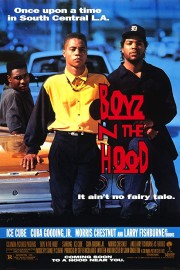Boyz N the Hood
When Columbia greenlit John Singleton’s “Boyz N the Hood” in the early ’90s, they wanted their own “Do the Right Thing.” But Singleton comes at black life in America from a different vantage point than Spike Lee, and that’s part of why he matters as a filmmaker. That’s more clear after watching “Boyz N the Hood” for the first time this year than being just familiar with him after “Rosewood,” “Baby Boy,” “Shaft” and “2 Fast 2 Furious.” Singleton seems to want to look at black America from within (which is the perspective we get in “Hood” and “Baby Boy”), while Lee has always looked at a larger societal picture in his best films. Both perspectives matter, and Singleton’s is one I’m looking to dig deeper into after this experience.
From frame one, there’s something personal and experiential about “Boyz N the Hood.” Singleton’s Oscar-nominated screenplay was based on his life growing up in South Central Los Angeles, and that authenticity makes it feel like real-life unfolding before our eyes than a movie. This isn’t gritty “from the streets” reality, though, but street life seen through memories remembered (“Stand By Me” is an inspiration, in some scenes), as Tre, who struggles in school living with his mother (Angela Bassett), tries to navigate life on the edge of violence when he goes to live with his father (Laurence Fishburne) in 1984, and the film cuts to seven years later, as Tre (played by Cuba Gooding Jr.) is spending time with his friends, has a girlfriend, and is trying to live life by the example his father Furious has attempted to set for him. The tension throughout the film is, can Tre live up to his father’s example, or will violence take him like it does so many other black men?
This was Singleton’s directorial debut, and it was so impressive that it netted him Oscar nods for writing and directing, making him the youngest director nominated, at the time, and the first African-American director. It is not all hype, though. Singleton tells his story with heart, humor and tension as Tre and his friends- Ricky (Morris Chestnut) and his brother, Darren (better known as Doughboy, and played by Ice Cube)- find themselves at a crossroads in their lives. Tre is trying to stay on the straight and narrow like his father has taught him, while Ricky is working on trying to get into college on a football scholarship. Doughboy is neck deep in the type of life Tre’s father is trying to keep him away from, however; he has just gotten out of a stint in prison, and he often spends his time on the porch with his friends, one of whom is in a wheelchair after getting shot, and he cannot help but find himself in trouble. The film’s primary focus is on Tre, his relationship with Brandi (Nia Long), and his father trying to keep him on the straight and narrow. There is fantastic acting throughout the film, with Gooding Jr. and Fishburne standing out in the cast, although you see clearing why Chestnut and Ice Cube became actors to be reckoned with, as well. (And now Oscar-winner Regina King shines as Shalika, Doughboy’s girlfriend, in a handful of scenes.)
Finally watching “Boyz N the Hood,” it makes me wish I had seen it sooner, but more than that, it also makes me want to really dig into Singleton’s other films that I haven’t seen more, especially his two follow-ups to this one, “Poetic Justice” and “Higher Learning.” And a rewatch of “Baby Boy” feels like it’s in order, as well, since it focuses on another black life at a similar point in time as Tre is here, and how he struggles with the responsibilities of being a man. I’ll get there, though. Singleton is a filmmaker back on my radar. I wish I had let his terrific directorial debut get him there a long time ago.










